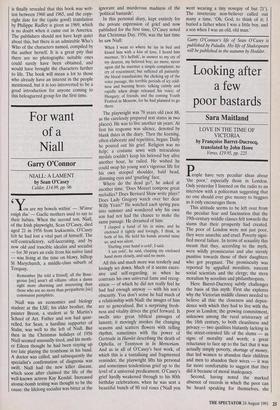For want of a Niall
Garry O'Connor
NIALL: A LAMENT by Sean O'Casey Calder, £14.99, pp. 96 ou are my bowels within' — ?Winne estigh thu' — Gaelic mothers used to say to their babies. When the second son, Niall, of the Irish playwright, Sean O'Casey, died aged 21 in 1956 from leukaemia, O'Casey felt he had lost a vital part of himself. The self-contradictory, self-lacerating, and by now old and irascible idealist and socialist — for 30 years an exile from his native land — was living at the time on blowy, hilltop St Marychurch, a middle-class suburb of Torquay.
Remember [he told a friend], all the Bour- geoise [sic] aren't all villains: often a damn sight more charming and interesting than those who are no more than peripathetic [sic] communist pamphlets.
Niall was an economics and biology student at the LSE; his elder brother, the painter Breon, a student at St Martin's School of Art. Father and son had quar- relled, for Sean, a hardline supporter of Stalin, was well to the left of Niall. But then in the Christmas holidays of 1956 Niall seemed unusually tired, and his moth- er Eileen thought he had been staying up too late playing the trombone in his band. A doctor was called, and subsequently the specialist's confirmation of diagnosis was swift. Niall had the new killer disease, which soon after claimed the life of the well-known actress Kay Kendal. Increased atomic-bomb testing was thought to be the cause: the lifelong socialist was bitter at the ignorant and murderous madness of the `political bastards'.
In this personal diary, kept entirely for the private expression of grief and now published for the first time, O'Casey noted that Christmas Day, 1956, was the last time he saw Niall:
When I went to where he lay in bed and kissed him with a kiss of love, I heard him murmur, 'It's hellish', in answer to my cry of my dearest, my beloved boy; no more; never again did he murmur a simple complaint; no cry of resentment; but suffered all patiently: the blood transfusions; the choking up of the voice passage, the terrible periods of icy cold- ness and burning heats; talking calmly and rapidly when drugs released his voice; of Hungary; of friends; and the coming Youth Festival in Moscow, for he had planned to go there.
The playwright was 78 years old (not 88, as the carelessly prepared text states in two places). He was to live another six years. At first his response was silence, denoted by blank dates in the diary. Then the keening, often elaborate and repetitive, began. Daily he poured out his grief. Religion was no help; a costume sewn with miraculous medals couldn't keep his beloved boy alive another hour, he railed. He wished he could swap his young son's vigorous life for his own stooped shoulder, bald head, dimming eyes and 'gnarling' face. Where do the dead go?, he asked at another time. 'Does Mozart compose great melodies? Does Bernard Shaw write plays? Does Lady Gregory watch over her dear Willy Yeats?' He watched each spring pass into summer and wondered why his own son had not had the chance to make the same passage. He dreamed of him:
I clasped a hand of his in mine, and he enclosed it tightly and lovingly, I think, in both of his. He held his hands around mine so, and was silent.
`Darling, your hand is cold', I said.
`I am cold', he said, clasping my enclosed hand more closely, and said no more.
All this and much more was tenderly and lovingly set down. Much of it seems exces- sive and self-regarding, as when he contrasts his own universal fame and recog- nition — of which he did not really feel he had had enough anyway — with his son's obscurity. You don't sense he had much of a relationship with Niall: the images of him are so generalised. But a surprising fresh- ness and vitality drives the grief forward. It swells into great biblical passages of lament; it movingly invokes the changing seasons and scatters flowers with telling rhythm, sometimes with the power of Gertrude in Hamlet describing the death of Ophelia, or Tennyson in In Memoriam. And as in all of O'Casey's best work, of which this is a tantalising and fragmented reminder, the playwright lifts his personal and sometimes tendentious grief up to the level of a universal predicament. O'Casey's grief hardly weakened through to his 80th birthday celebrations, when he was sent a beautiful bunch of 80 red roses (`Niall you
went wearing a tiny nosegay of but 21'). The inveterate non-believer called out many a time, 'Oh, God, to think of it; I buried a father when I was a little boy, and a son when I was an old, old man.'
Gany O'Connor's life of Sean O'Casey is published by Paladin. His life of Shakespeare will be published in the autumn by Hodder.


















































 Previous page
Previous page